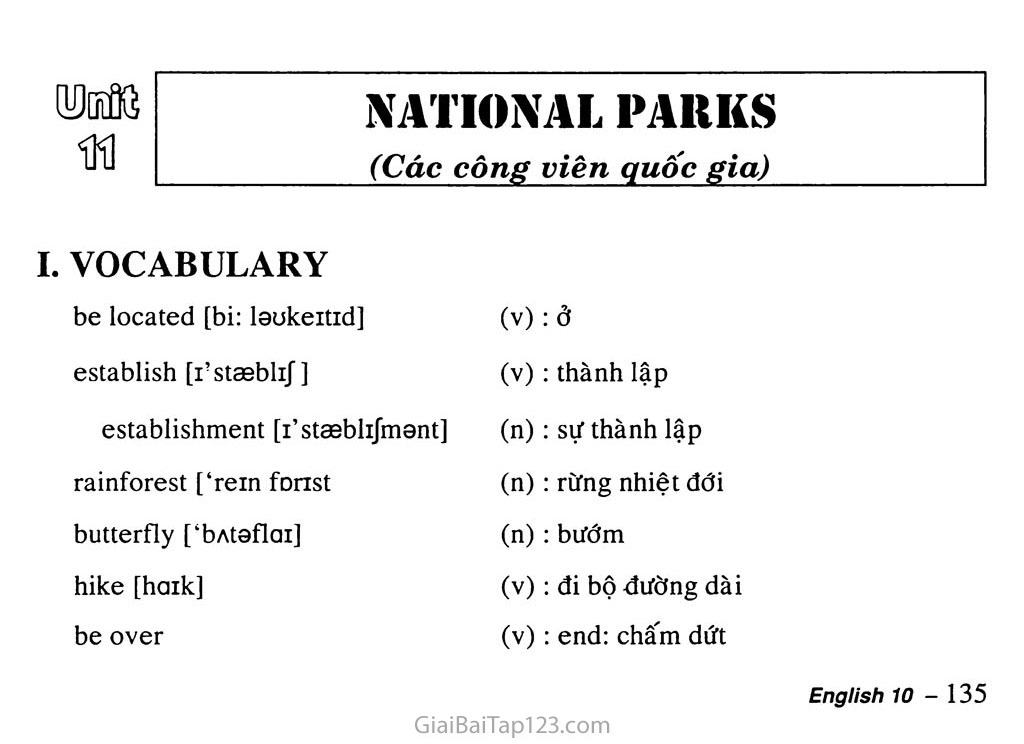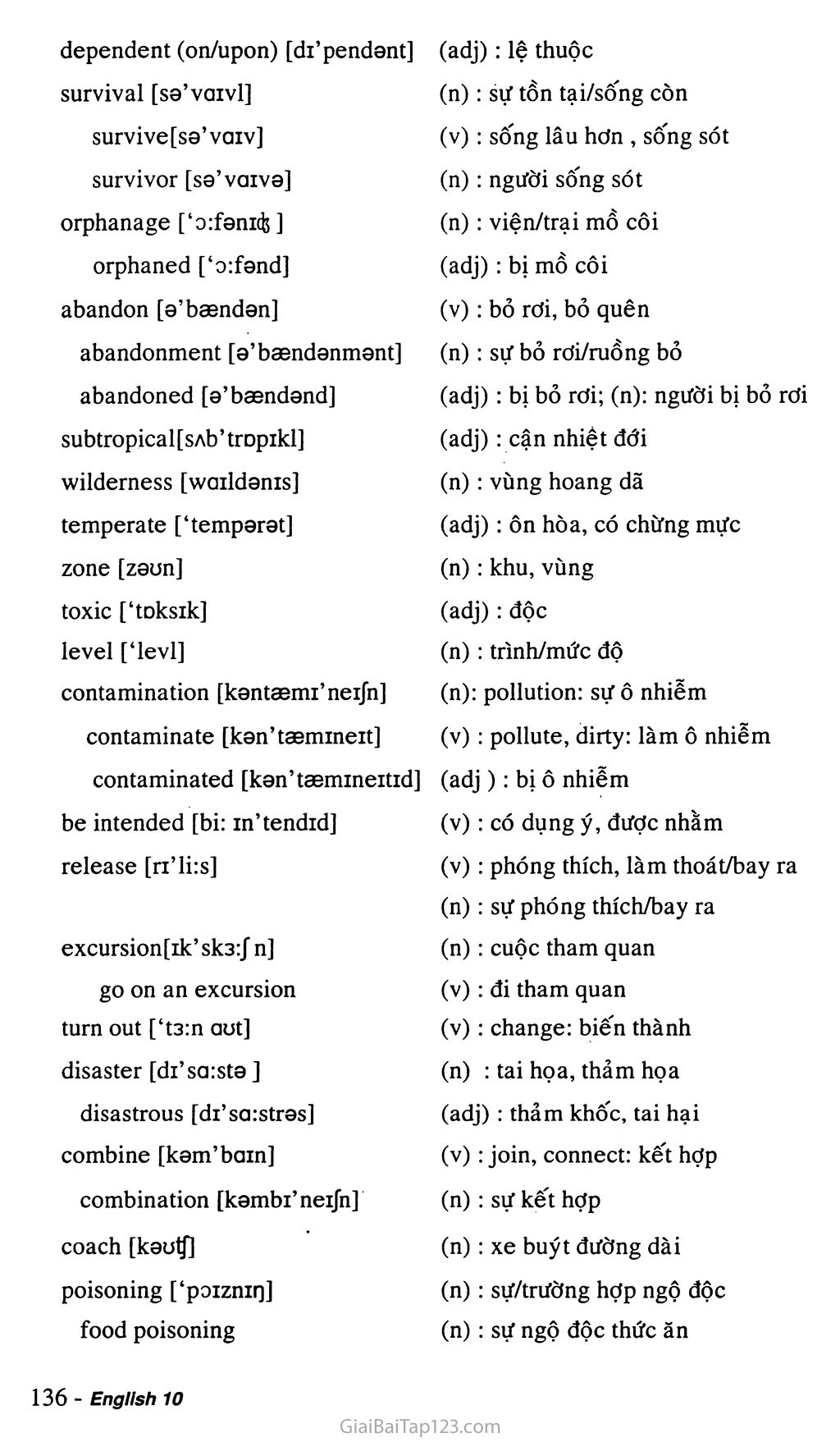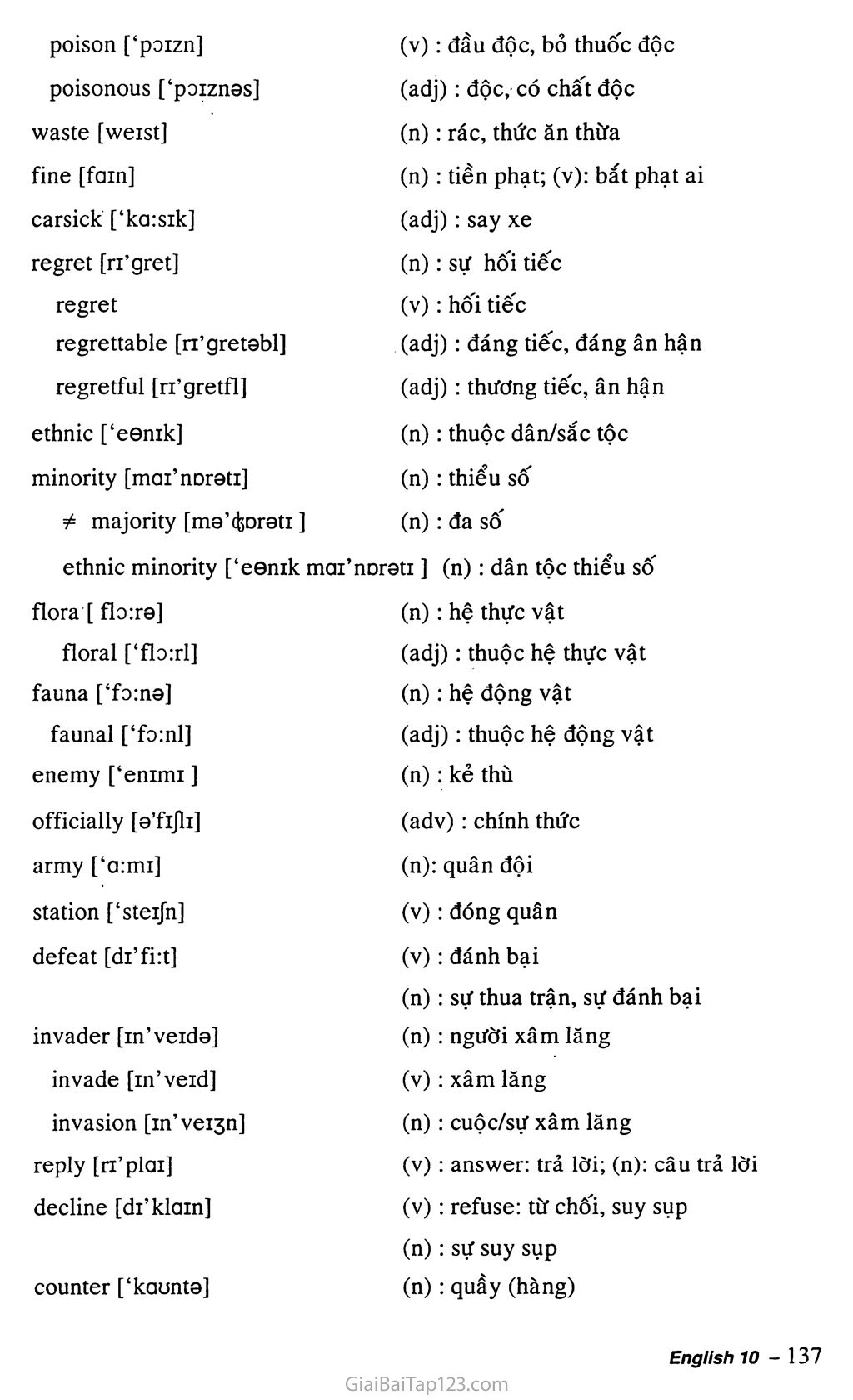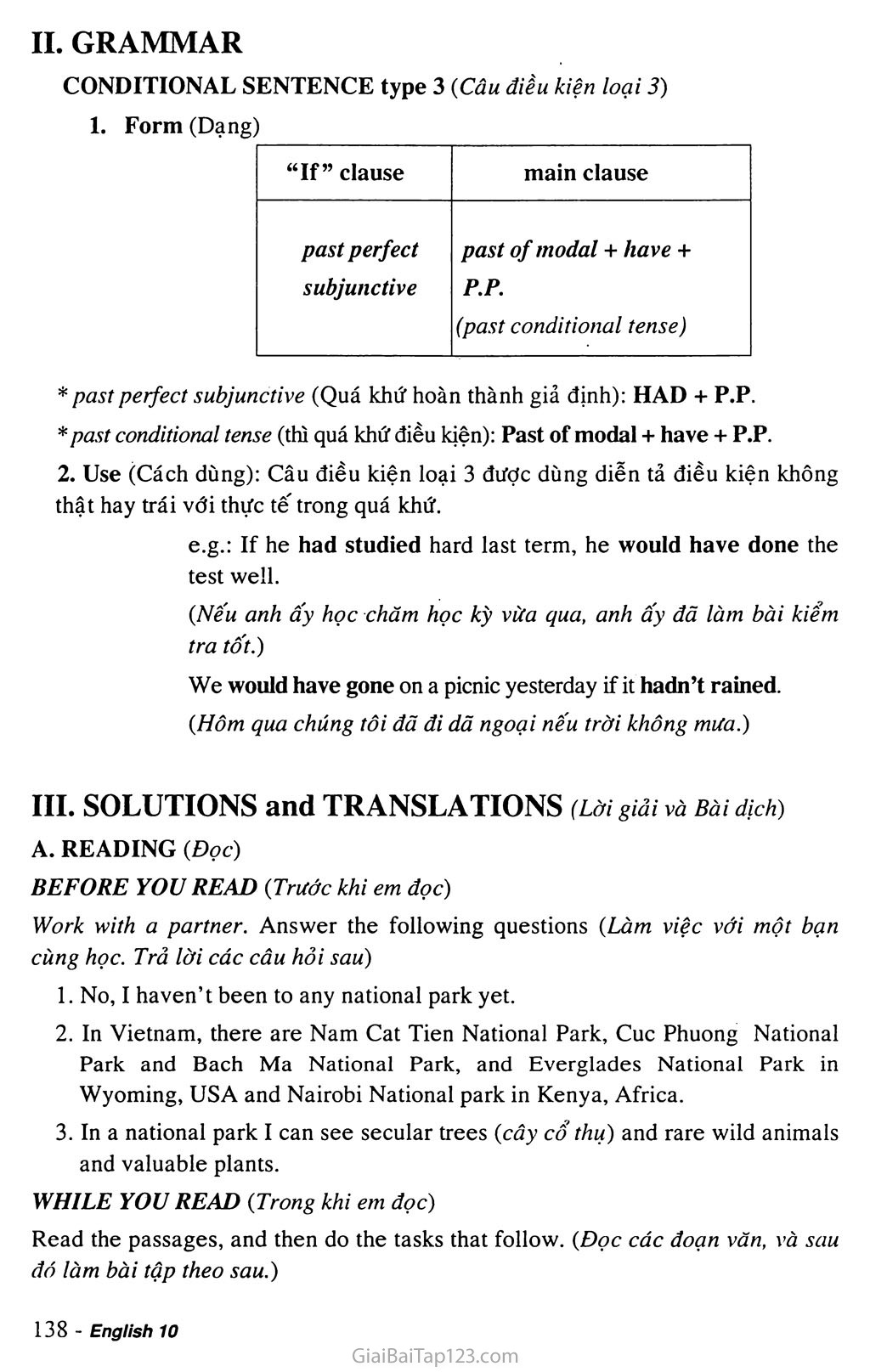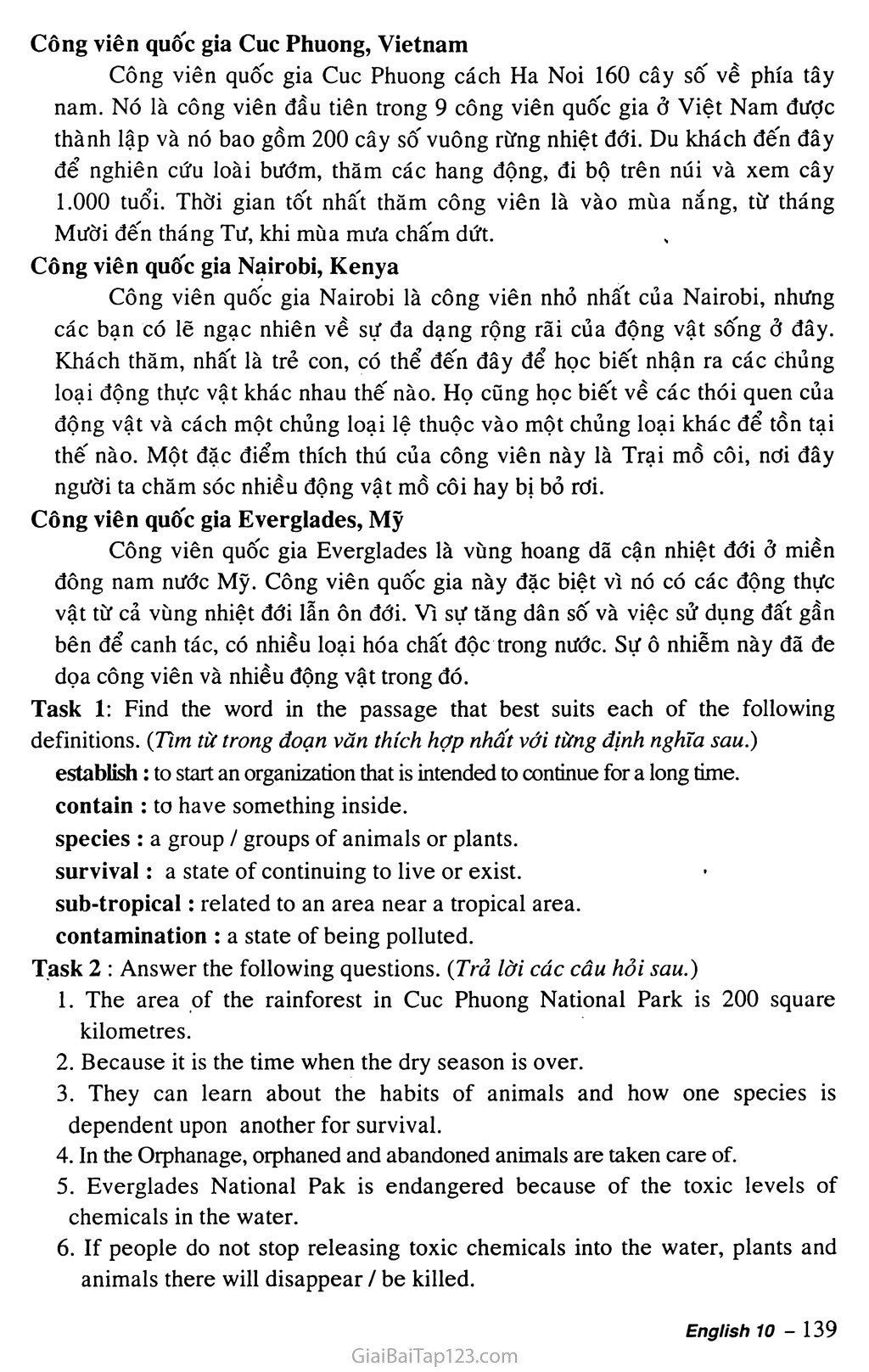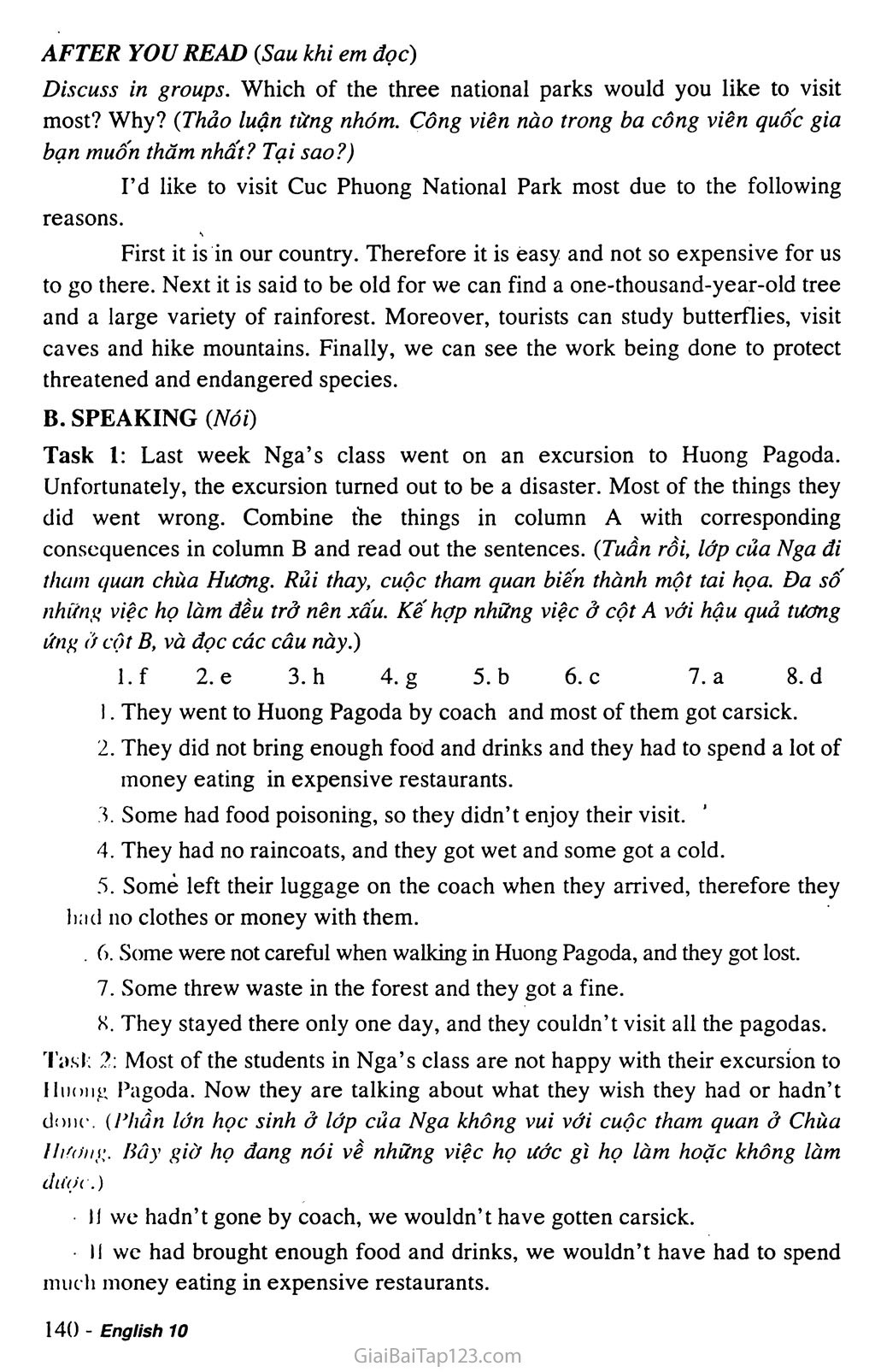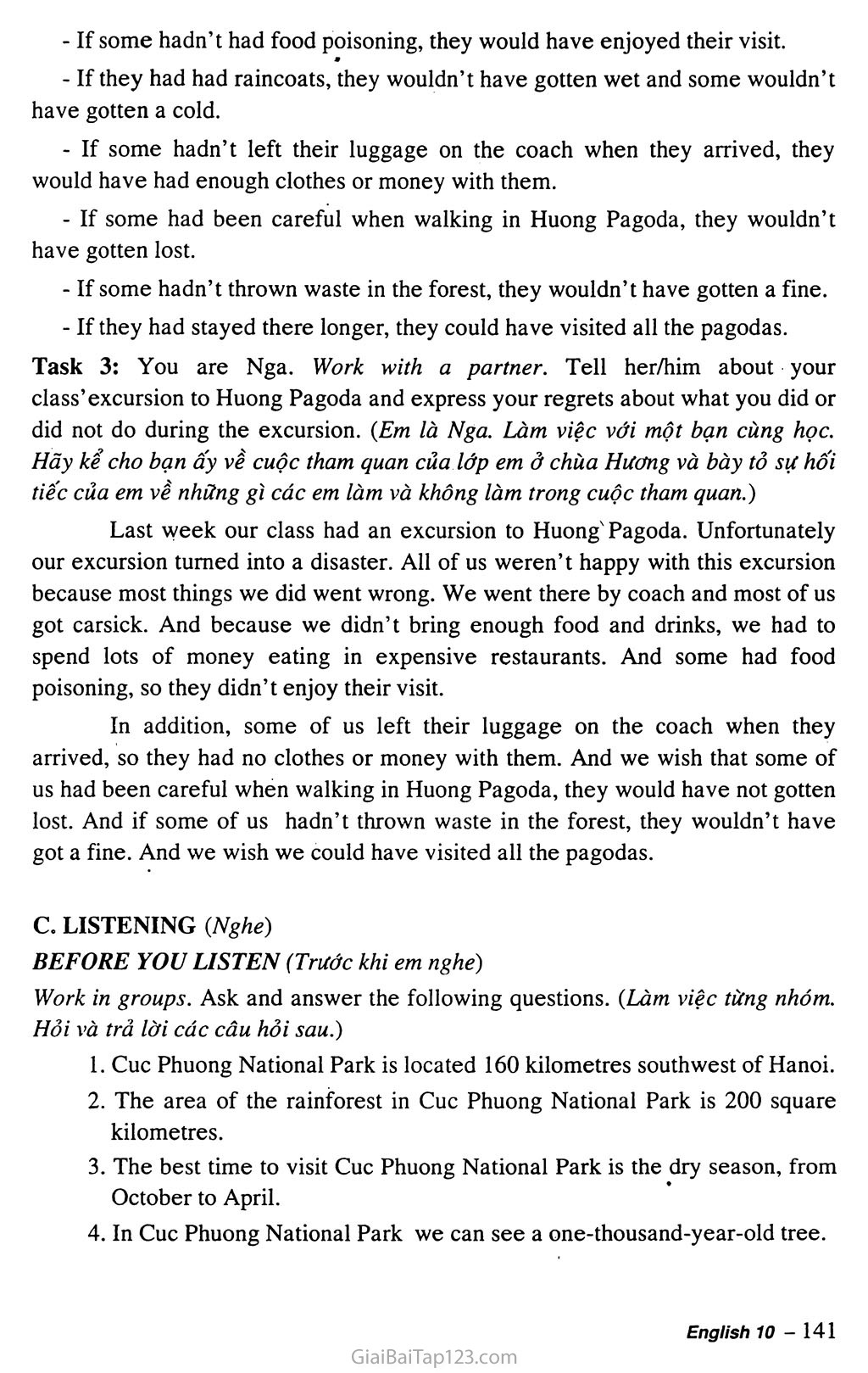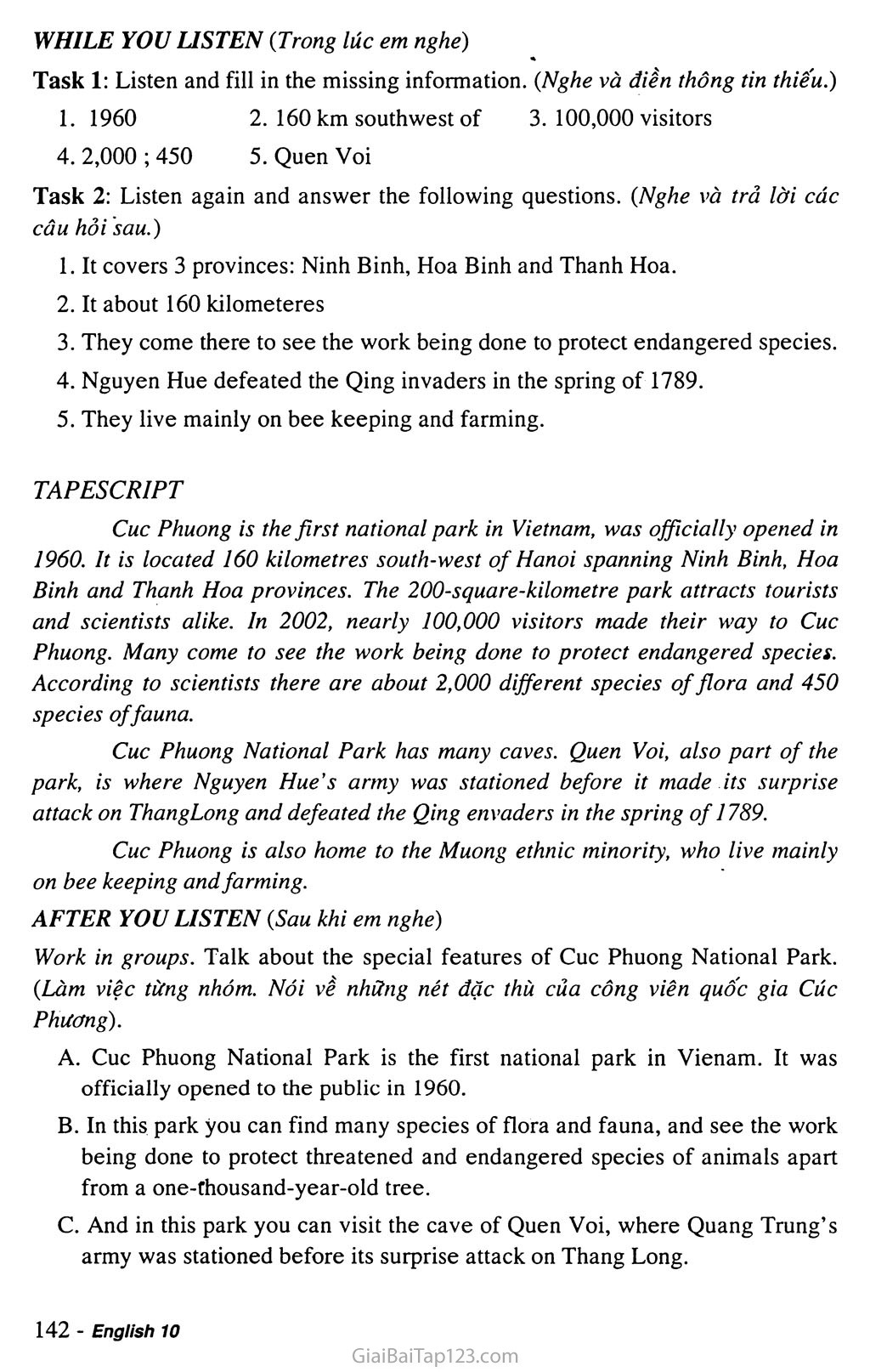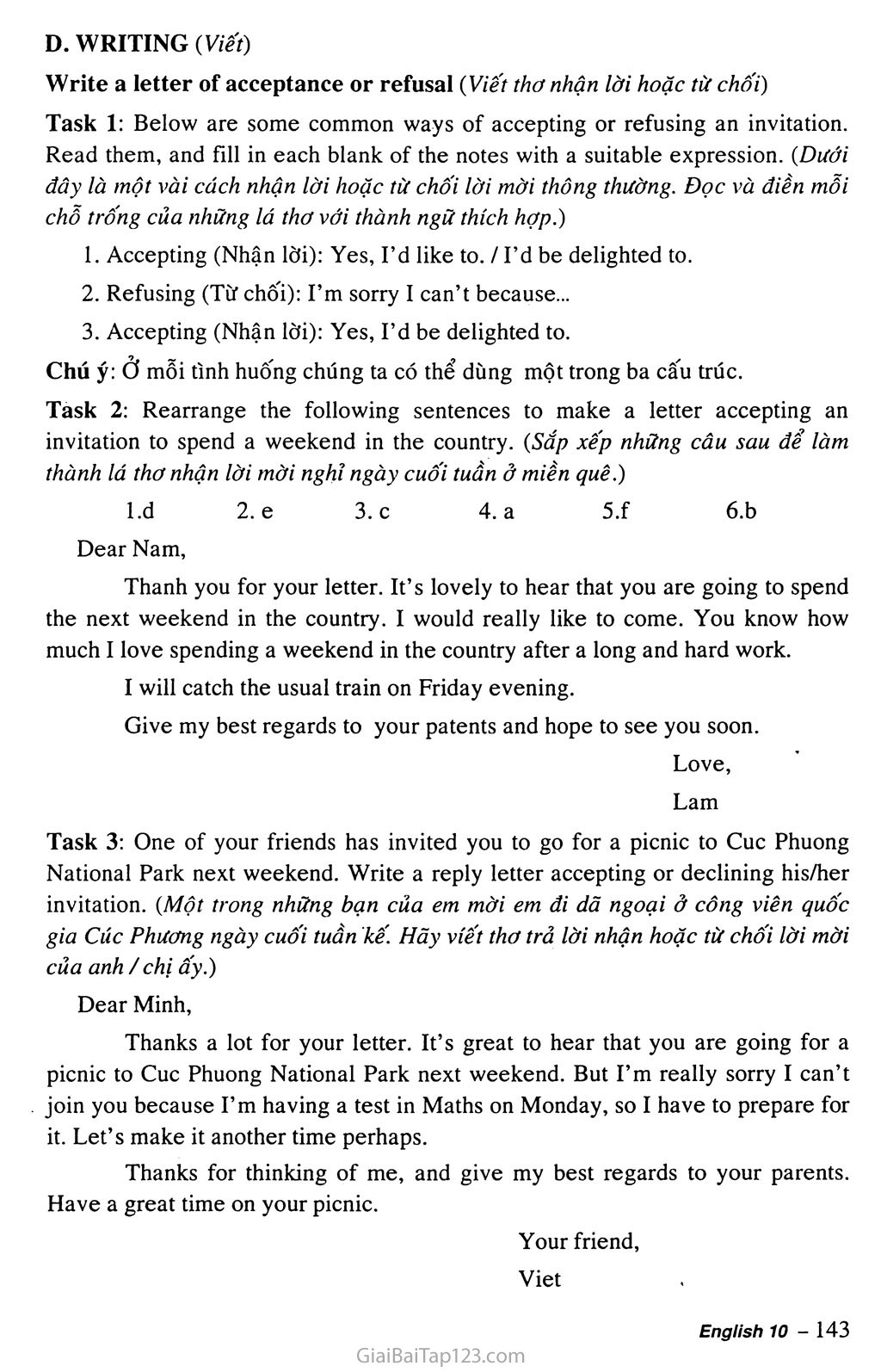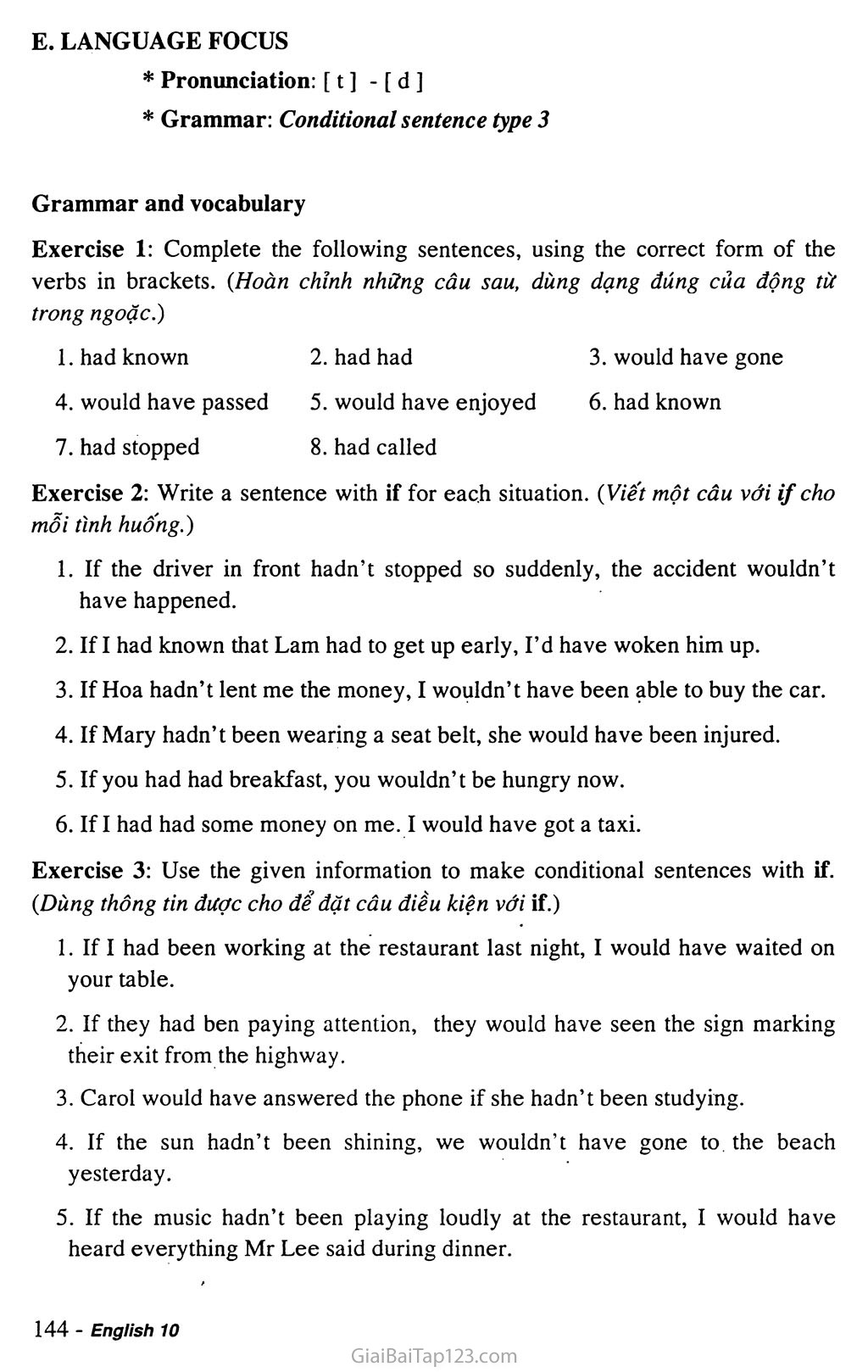Giải tiếng Anh lớp 10 Unit 11: National Parks
NATIONAL PARKS
(Các công viên quốc gia)
(v):ở
(v) : thành lập
I. VOCABULARY
be located [bi: lookeitid] establish [fsteeblif]
establishment [I’stasblijmont] (n) : sự thành lập
rainforest [‘rein fDrist butterfly [‘bAtoflai] hike [haik] be over (n) : rừng nhiệt đới (n) : bướm (v) : đi bộ dường dài (v) : end: châm dứt
dependent (on/upon) [di’ pendent]
(adj): lệ thuộc
survival [sa’vaivl]
(n): sự tồn tại/sống còn
survive[sa’vaiv]
(v) : sông lâu hơn , sống sót
survivor [sa’vaiva]
(n): người sông sót
orphanage [‘o:fannfe ]
(n) : viện/trại mồ côi
orphaned [‘o:fand]
(adj) : bị mồ côi
abandon [a’bsendan]
(v): bỏ rơi, bỏ quên
abandonment [a’baendanmant]
(n) : sự bỏ rơi/ruồng bỏ
abandoned [a’baendand]
(adj) : bị bỏ rơi; (n): người bị bỏ rơi
subtropical[sAb’trDpikl]
(adj) : cận nhiệt đới
wilderness [waildanis]
(n): vùng hoang dã
temperate [‘temparat]
(adj) : ôn hòa, có chừng mực
zone [zaun]
(n) : khu, vùng
toxic [‘tDksik]
(adj) : độc
level [‘levl]
(n) : trình/mức độ
contamination [kantaemi’neijn]
(n): pollution: sự ô nhiễm
contaminate [kan’taemineit]
(v) : pollute, dirty: làm ô nhiễm
contaminated [kan’tsemineitid]
(adj) : bị ô nhiễm
be intended [bi: in’tendid]
(v) : có dụng ý, được nhằm
release [ri’li:s]
(v) : phóng thích, làm thoát/bay ra
(n): sự phóng thích/bay ra
excursion[ik’sk3:J n]
(n): cuộc tham quan
go on an excursion
(v) : đi tham quan
turn out [‘t3:n out]
(v):change:biến thành
disaster [di’sa:sta ]
(n) : tai họa, thảm họa
disastrous [di’sa:stras]
(adj) : thảm khóc, tai hại
combine [kam’bain]
(v) : join, connect: kết hợp
combination [kambl’neifn]
(n) : sự kết hợp
coach [kautf]
(n) : xe buýt đường dài
poisoning [‘poiznir)]
(n) : sự/trường hợp ngộ độc
food poisoning
(n) : sự ngộ độc thức ăn
poison [‘poizn]
(v) : đầu độc, bỏ thuốc độc
poisonous [‘poiznas]
(adj) : độc, có chất độc
waste [weist]
(n) : rác, thức ăn thừa
fine [fain]
(n) : tiền phạt; (v): bắt phạt ai
carsick [lka:sik]
(adj) : say xe
regret [ri’gret]
(n): sự hôi tiếc
regret
(v) : hối tiếc
regrettable [ri’gretabl]
(adj) : đáng tiếc, đáng ân hận
regretful [ri’gretfl]
(adj) : thương tiếc, ân hận
ethnic [‘eemk]
(n): thuộc dân/sắc tộc
minority [mai’nDrati]
(n) : thiểu số
+ majority [ma’tfeDrati ]
(n) : đa sô"
ethnic minority [‘eOnik mai’nDrati ] (n) : dân tộc thiểu số
flora [ flo:ra]
(n) : hệ thực vật
floral [lflo:rl]
(adj) : thuộc hệ thực vật
fauna [‘fo:na]
(n) : hệ động vật
faunal [lfo:nl]
(adj) : thuộc hệ động vật
enemy [‘enimi ]
(n) : kẻ thù
officially [a'fljli]
(adv) : chính thức
army [‘a:mi]
(n): quân đội
station [‘steijn]
(v) : đóng quân
defeat [di’fkt]
(v) : đánh bại
(n) : sự thua trận, sự đánh bại
invader [in’veida]
(n) : người xâm lăng
invade [in’veid]
(v) : xâm lăng
invasion [in’vei3n]
(n) : cuộc/sựxâm lăng
reply [n’plai]
(v) : answer: trả lời; (n): câu trả lời
decline [di’klain]
(v): refuse: từ chổi, suy sụp (n): sự suy sụp
counter [‘kaunta]
(n) : quầy (hàng)
II. GRAMMAR
CONDITIONAL SENTENCE type 3 (Câu điều kiện loại 3) 1. Form (Dạng)
“If” clause
main clause
past perfect subjunctive
past of modal + have +
p.p.
(past conditional tense)
past perfect subjunctive (Quá khứ hoàn thành giả định): HAD + p.p.
past conditional tense (thì quá khứ điều kịện): Past of modal + have + P.P.
Use (Cách dùng): Câu điều kiện loại 3 được dùng diễn tả điều kiện không thật hay trái với thực tế trong quá khứ.
e.g.: If he had studied hard last term, he would have done the test well.
(Nếu anh ấy học chăm học kỳ vừa qua, anh ấy đã làm bài kiểm tra tốt.)
We would have gone on a picnic yesterday if it hadn’t rained.
(Hôm qua chúng tôi đã đi dã ngoại nếu trời không mưa.)
III. SOLUTIONS and TRANSLATIONS (Lời giải và Bài dịch)
A. READING (Đọc)
BEFORE YOU READ (Trước khi em đọc)
Work with a partner. Answer the following questions (Làm việc với một bạn cùng học. Trả lời các câu hỏi sau)
No, I haven’t been to any national park yet.
In Vietnam, there are Nam Cat Tien National Park, Cue Phuong National Park and Bach Ma National Park, and Everglades National Park in Wyoming, USA and Nairobi National park in Kenya, Africa.
In a national park I can see secular trees (cây cổ thụ) and rare wild animals and valuable plants.
WHILE YOU READ (Trong khi em đọc)
Read the passages, and then do the tasks that follow. (Đọc các đoạn văn, và sau dó làm bài tập theo sau.)
Công viên quốc gia Cue Phuong, Vietnam
Công viên quốc gia Cue Phuong cách Ha Noi 160 cây số về phía tây nam. Nó là công viên đầu tiên trong 9 công viên quốc gia ở Việt Nam được thành lập và nó bao gồm 200 cây số’ vuông rừng nhiệt đới. Du khách đến đây để nghiên cứu loài bướm, thăm các hang động, đi bộ trên núi và xem cây 1.000 tuổi. Thời gian tốt nhất thăm công viên là vào mùa nắng, từ tháng Mười đến tháng Tư, khi mùa mưa chấm dứt.
Công viên quổc gia Nairobi, Kenya
Công viên quốc gia Nairobi là công viên nhỏ nhát của Nairobi, nhưng các bạn có lẽ ngạc nhiên về sự đa dạng rộng rãi của động vật sông ở đây. Khách thăm, nhất là trẻ con, có thể đến đây để học biết nhận ra các chủng loại động thực vật khác nhau thế nào. Họ cũng học biết về các thói quen của động vật và cách một chủng loại lệ thuộc vào một chủng loại khác để tồn tại thế nào. Một đặc điểm thích thú của công viên này là Trại mồ côi, nơi đây người ta chăm sóc nhiều động vật mồ côi hay bị bỏ rơi.
Công viên quốc gia Everglades, Mỹ
Công viên quốc gia Everglades là vùng hoang dã cận nhiệt đới ở miền đông nam nước Mỹ. Công viên quốc gia này đặc biệt vì nó có các động thực vật từ cả vùng nhiệt đới lẫn ôn đới. Vì sự tăng dân số và việc sử dụng đất gần bên để canh tác, có nhiều loại hóa chất độc trong nước. Sự ô nhiễm này đã đe dọa công viên và nhiều động vật trong đó.
Task 1: Find the word in the passage that best suits each of the following definitions. (Tìm từ trong đoạn văn thích hợp nhất với từng định nghĩa sau.)
establish: to start an organization that is intended to continue for a long time.
contain : to have something inside.
species : a group / groups of animals or plants.
survival: a state of continuing to live or exist.
sub-tropical: related to an area near a tropical area.
contamination : a state of being polluted.
Task 2 : Answer the following questions. (Trả lời các câu hỏi sau.)
The area of the rainforest in Cue Phuong National Park is 200 square kilometres.
Because it is the time when the dry season is over.
They can learn about the habits of animals and how one species is dependent upon another for survival.
In the Orphanage, orphaned and abandoned annuals are taken care of.
Everglades National Pak is endangered because of the toxic levels of chemicals in the water.
If people do not stop releasing toxic chemicals into the water, plants and animals there will disappear / be killed.
AFTER YOU READ (Sau khi em đọc)
Discuss in groups. Which of the three national parks would you like to visit most? Why? (Thảo luận từng nhóm. Công viên nào trong ba công viên quốc gia bạn muốn thăm nhất? Tại sao?)
I’d like to visit Cue Phuong National Park most due to the following reasons.
First it is in our country. Therefore it is easy and not so expensive for US to go there. Next it is said to be old for we can find a one-thousand-year-old tree and a large variety of rainforest. Moreover, tourists can study butterflies, visit caves and hike mountains. Finally, we can see the work being done to protect threatened and endangered species.
B. SPEAKING (Nói)
Task 1: Last week Nga’s class went on an excursion to Huong Pagoda. Unfortunately, the excursion turned out to be a disaster. Most of the things they did went wrong. Combine the things in column A with corresponding consequences in column B and read out the sentences. (Tuần rồi, lớp của Nga đi tham quan chùa Hương. Rủi thay, cuộc tham quan biến thành một tai họa. Đa số những việc họ làm đều trở nên xấu. Kê' hợp những việc ở cột A với hậu quả tương ứng ở cột B, và đọc các câu này.)
f 2. e 3. h 4. g 5. b 6.C 7. a 8. d
They went to Huong Pagoda by coach and most of them got carsick.
They did not bring enough food and drinks and they had to spend a lot of money eating in expensive restaurants.
Some had food poisoning, so they didn’t enjoy their visit.
They had no raincoats, and they got wet and some got a cold.
Some left their luggage on the coach when they arrived, therefore they had no clothes or money with them.
. 6. Some were not careful when walking in Huong Pagoda, and they got lost.
Some threw waste in the forest and they got a fine.
They stayed there only one day, and they couldn’t visit all the pagodas.
Task 2: Most of the students in Nga’s class are not happy with their excursion to Huong Pagoda. Now they are talking about what they wish they had or hadn’t done. (Phần lớn học sinh ở lớp của Nga không vui với cuộc tham quan ở Chùa Hương. Bây giờ họ đang nói về những việc họ ước gì họ làm hoặc không làm được.)
11 we hadn’t gone by coach, we wouldn’t have gotten carsick.
II we had brought enough food and drinks, we wouldn’t have had to spend
much money eating in expensive restaurants.
If some hadn’t had food poisoning, they would have enjoyed their visit.
*
If they had had raincoats, they wouldn’t have gotten wet and some wouldn’t have gotten a cold.
If some hadn’t left their luggage on the coach when they arrived, they would have had enough clothes or money with them.
If some had been careful when walking in Huong Pagoda, they wouldn’t have gotten lost.
If some hadn’t thrown waste in the forest, they wouldn’t have gotten a fine.
If they had stayed there longer, they could have visited all the pagodas.
Task 3: You are Nga. Work with a partner. Tell her/him about your class’excursion to Huong Pagoda and express your regrets about what you did or did not do during the excursion. (Em là Nga. Làm việc với một bạn cùng học. Hãy kể cho bạn ấy về cuộc tham quan của lớp em ở chùa Hương và bày tỏ sự hối tiếc của em về những gì các em làm và không làm trong cuộc tham quan.)
Last week our class had an excursion to Huong Pagoda. Unfortunately our excursion turned into a disaster. All of us weren’t happy with this excursion because most things we did went wrong. We went there by coach and most of US got carsick. And because we didn’t bring enough food and drinks, we had to spend lots of money eating in expensive restaurants. And some had food poisoning, so they didn’t enjoy their visit.
In addition, some of US left their luggage on the coach when they arrived, so they had no clothes or money with them. And we wish that some of us had been careful when walking in Huong Pagoda, they would have not gotten lost. And if some of US hadn’t thrown waste in the forest, they wouldn’t have got a fine. And we wish we could have visited all the pagodas.
c. LISTENING (Nghè)
BEFORE YOU LISTEN (Trước khi em nghe)
Work in groups. Ask and answer the following questions. (Làm việc từng nhóm. Hỏi và trả lời các câu hỏi sau.)
Cue Phuong National Park is located 160 kilometres southwest of Hanoi.
The area of the rainforest in Cue Phuong National Park is 200 square kilometres.
The best time to visit Cue Phuong National Park is the dry season, from
October to April.
In Cue Phuong National Park we can see a one-thousand-year-old tree.
WHILE YOU LISTEN (Trong lúc em nghe)
Task 1: Listen and fill in the missing information. (Nghe và điền thông tin thiếu.)
1960 2. 160 km southwest of 3. 100,000 visitors
2,000 ; 450 5. Quen Voi
Task 2: Listen again and answer the following questions. (Nghe và trả lời các câu hỏi sau.)
It covers 3 provinces: Ninh Binh, Hoa Binh and Thanh Hoa.
It about 160 kilometeres
They come there to see the work being done to protect endangered species.
Nguyen Hue defeated the Qing invaders in the spring of 1789.
They live mainly on bee keeping and farming.
TAPESCRIPT
Cue Phuong is the first national park in Vietnam, was officially opened in 1960. It is located 160 kilometres south-west of Hanoi spanning Ninh Binh, Hoa Binh and Thanh Hoa provinces. The 200-square-kilometre park attracts tourists and scientists alike. In 2002, nearly 100,000 visitors made their way to Cue Phuong. Many come to see the work being done to protect endangered species. According to scientists there are about 2,000 different species of flora and 450 species of fauna.
Cue Phuong National Park has many caves. Quen Voi, also part of the park, is where Nguyen Hue’s army was stationed before it made its surprise attack on ThangLong and defeated the Qing envaders in the spring of 1789.
Cue Phuong is also home to the Muong ethnic minority, who live mainly on bee keeping and farming.
AFTER YOU LISTEN (Sau khi em nghe)
Work in groups. Talk about the special features of Cue Phuong National Park. (Làm việc từng nhóm. Nói về những nét dặc thù của công viên quốc gia Cúc Phương).
Cue Phuong National Park is the first national park in Vienam. It was officially opened to the public in 1960.
In this park you can find many species of flora and fauna, and see the work being done to protect threatened and endangered species of animals apart from a one-thousand-year-old tree.
c. And in this park you can visit the cave of Quen Voi, where Quang Trung’s army was stationed before its surprise attack on Thang Long.
D. WRITING (Viết)
Write a letter of acceptance or refusal (Viết thơ nhận lời hoặc từ chối)
Task 1: Below are some common ways of accepting or refusing an invitation. Read them, and fill in each blank of the notes with a suitable expression. (Dưới đây là một vài cách nhận lời hoặc từ chối lời mời thông thường. Đọc và điền mỗi chỗ trống của những lá thơ với thành ngữ thích hợp.)
Accepting (Nhận lời): Yes, I’d like to. / I’d be delighted to.
Refusing (Từ chối): I’m sorry I can’t because...
Accepting (Nhận lời): Yes, I’d be delighted to.
Chú ý: Ớ mỗi tình huống chúng ta có thể dùng một trong ba cấu trúc.
Task 2: Rearrange the following sentences to make a letter accepting an invitation to spend a weekend in the country. (Sắp xếp những câu sau để làm thành lá thơ nhận lời mời nghỉ ngày cuối tuần ở miền quê.)
l.d 2. e 3. c 4. a 5.f 6.b
Dear Nam,
Thanh you for your letter. It’s lovely to hear that you are going to spend the next weekend in the country. I would really like to come. You know how much I love spending a weekend in the country after a long and hard work.
I will catch the usual train on Friday evening.
Give my best regards to your patents and hope to see you soon.
Love,
Lam
Task 3: One of your friends has invited you to go for a picnic to Cue Phuong National Park next weekend. Write a reply letter accepting or declining his/her invitation. (Một trong những bạn của em mời em đi dã ngoại ở công viên quốc gia Cúc Phương ngày cuối tuần kế. Hãy viết thơ trả lời nhận hoặc từ chối lời mời của anh/chị ấy.)
Dear Minh,
Thanks a lot for your letter. It’s great to hear that you are going for a picnic to Cue Phuong National Park next weekend. But I’m really sorry I can’t join you because I’m having a test in Maths on Monday, so I have to prepare for it. Let’s make it another time perhaps.
Thanks for thinking of me, and give my best regards to your parents. Have a great time on your picnic.
Your friend,
Viet
E. LANGUAGE FOCUS
Pronunciation: [ t ] - [ d ]
Grammar: Conditional sentence type 3
Grammar and vocabulary
Exercise 1: Complete the following sentences, using the correct form of the verbs in brackets. {Hoàn chỉnh những câu sau, dùng dạng đúng của động từ trong ngoặc.)
1. had known
2. had had
3. would have gone
4. would have passed 7. had stopped
would have enjoyed 6. had known
had called
Exercise 2: Write a sentence with if for each situation. {Viết một câu với if cho mỗi tình huống.)
If the driver in front hadn’t stopped so suddenly, the accident wouldn’t have happened.
If I had known that Lam had to get up early, I’d have woken him up.
If Hoa hadn’t lent me the money, I wouldn’t have been able to buy the car.
If Mary hadn’t been wearing a seat belt, she would have been injured.
If you had had breakfast, you wouldn’t be hungry now.
If I had had some money on me. I would have got a taxi.
Exercise 3: Use the given information to make conditional sentences with if. {Dùng thông tin được cho để đặt câu điều kiện với if.)
If I had been working at the restaurant last night, I would have waited on your table.
If they had ben paying attention, they would have seen the sign marking their exit from the highway.
Carol would have answered the phone if she hadn’t been studying.
If the sun hadn’t been shining, we wouldn't have gone to the beach yesterday.
If the music hadn’t been playing loudly at the restaurant, I would have heard everything Mr Lee said during dinner.

